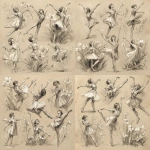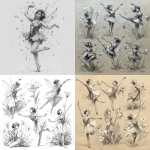Explore the Best AI Image Gallery

The Algorithmic Brush: AI Images in Marketing - A New Era for Creativity?
The marketing landscape is undergoing a seismic shift, driven by the emergence of artificial intelligence (AI) and its ability to generate stunningly realistic images. This technology, once confined to the realm of science fiction, is now empowering marketers with unprecedented creative tools, opening doors to innovative campaigns and personalized customer experiences.
A Canvas Powered by Code
AI image generators, fueled by complex algorithms and vast datasets of images, can create original visuals on demand. They can adapt to specific briefs, styles, and aesthetics, producing everything from product mockups and social media graphics to captivating advertising campaigns.
The Creative Potential: A Boon for Marketers
- Enhanced Efficiency: AI image generation significantly reduces the time and resources required for creating visuals, freeing up marketing teams to focus on strategy and content development.
- Cost-Effectiveness: The automation of image creation can lead to substantial cost savings compared to hiring freelance designers or agencies.
- Customization at Scale: Marketers can personalize images for different target audiences, demographics, or campaigns, creating a more engaging and relevant customer experience.
- Breaking Creative Barriers: AI tools can help overcome creative roadblocks by offering novel ideas and visual concepts that might not have been conceived otherwise.
Navigating the Ethical Landscape
While the potential benefits of AI image generation are undeniable, its crucial to acknowledge the ethical considerations that accompany this technology:
- Copyright and Ownership: Questions arise regarding the ownership of AI-generated images and the rights of artists whose work may have been used in training the algorithms.
- Bias and Representation: AI models can inherit biases present in the data they are trained on, potentially leading to the perpetuation of stereotypes or unfair representation.
- Transparency and Accountability: It is important to ensure transparency in how AI image generation works and establish mechanisms for accountability in case of misuse or unintended consequences.
Future Trends: The Evolving Landscape
The field of AI image generation is rapidly evolving, with continuous advancements shaping the future of marketing:
- Increased Realism and Customization: Expect even more realistic and customizable images, allowing for highly personalized and immersive marketing experiences.
- Integration with Other Technologies: AI image generation will likely be integrated with other technologies like augmented reality (AR) and virtual reality (VR), creating interactive and engaging campaigns.
- Ethical Frameworks and Regulations: As the technology matures, we can anticipate the development of ethical frameworks and regulations to address concerns surrounding copyright, bias, and accountability.
Conclusion
AI image generation presents both exciting opportunities and challenges for the marketing industry. While it offers powerful tools for creativity, efficiency, and personalization, it is essential to navigate the ethical implications responsibly. By embracing transparency, fairness, and continuous improvement, marketers can harness the power of AI to create innovative campaigns that resonate with consumers while upholding ethical standards.



](https://images.ai-img.art/thumbnails/150/915b5e50ce61f6219cb8f764d89e2efcb8ad3a9ebd09e0670ae7dc0e2c99a8bd.webp)
](https://images.ai-img.art/thumbnails/150/aed4d771a0a5b63bed28f6e7183dd4614c5e3e3586d300c8d879ccbb37dbfb4e.webp)



](https://images.ai-img.art/thumbnails/150/cf8299cc184c859eff89d17514689e19c7994ad29256a58ad77fa0f7218e2cff.webp)






](https://images.ai-img.art/thumbnails/150/78b567a3483191dd52f3d16038b5a926e03e4066d5b301cfff023fb91a962e67.webp)


](https://images.ai-img.art/thumbnails/150/476665d1452e44d38d5b4fbf5fab4389a6131d55b7bfe8a41d7f65f66b5a9310.webp)

























](https://images.ai-img.art/thumbnails/150/da89993919887fcf2c84af5ec12f2ac997ad0f67c8bf00fecd67ba06a1b3dc49.webp)




